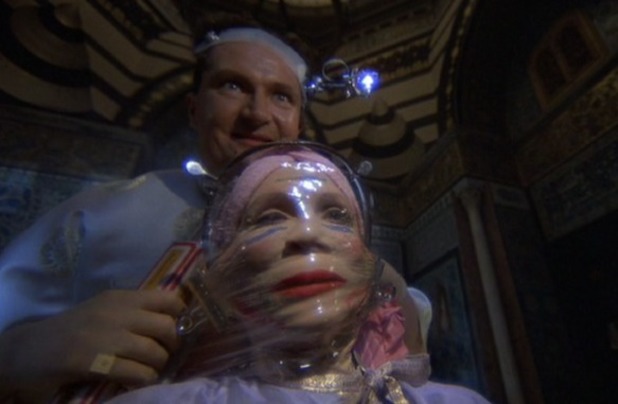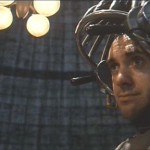incongruous – ADJECTIVE: Not in harmony or keeping with the surroundings or other aspects of something
You either love Terry Gilliam or you hate him, but what you can never deny is that he is an innovator of the first degree, and visually creative as any director in living memory. Some though not all of his movies are set in crazed dystopian futures following a satirical path from Nineteen Eighty-Four and Brave New World, but all his works feature a strong fantasy element which you can trace back to the brilliant and disturbing animations he put together in his Python years to link together bizarre sketches. A Freudian psychoanalyst would have a field day with those, but thankfully Gilliam’s career has not suffered by virtue of his unconventional and riotously vivid imagination.
Gilliam’s filmography tells it’s own story, including in Jabberwocky, Time Bandits, The Fisher King, 12 Monkeys, The Brothers Grimm and The Imaginarium of Doctor Parnassus among a good many more – movies that would almost certainly have not been attempted by any director other than Gilliam, but the fact that he is so prolific and studios keep funding his ideas says a great deal for the man – as does his ability to attract a wealth of prime acting talent. When they succeed they soar like stars, but when they fail they do so in a blaze of glory.
It would be fair to say that all Gilliam movies are notable for being rambling, patchy and flawed, possibly the result of being visualised in the mode of sketches and set pieces rather than a forming a coherent narrative with a beginning, middle and an end. His troubled production of Adventures of Baron Munchausen is a prime example, containing some of the very best and very worst in a stupendous fantasy that delivers strongly in imagination but falls short in continuity and cogency.
While this rule of thumb applies more to some more than to others, Brazil is as witty, cogent and yet as dark, bleak and horrific a vision as any Orwell could have dreamed up. It owes a huge debt to Orwell’s masterwork for the basic context, and could easily be a parallel set of events taking place while Winston Smith is engaged in a quite different challenge to the system. The relationship between the two is mentioned in the Wikipedia article:
Gilliam has stated that Brazil was inspired by George Orwell‘s Nineteen Eighty-Four—which he has admitted never having read — but is written from a contemporary perspective rather than looking to the future as Orwell did. In Gilliam’s words, his film was “the Nineteen Eighty-Four for 1984.” Critics and analysts have pointed out many similarities and differences between the two, an example being that contrary to Winston Smith, Sam Lowry’s spirit did not capitulate as he sank into complete catatonia
It is packed with loving attention to detail the bizarre madness of this crazily complex bureaucratic police state with a distinctly seedy underbelly, contrasted with Sam Lowry’s soaring fantasies, in which he meets the object of his dreams (who looks remarkably like Kim Greist) and later meets her in real life. Why this subject? Film critic Jack Matthews suggests a motive of:
“…satirising the bureaucratic, largely dysfunctional industrial world that had been driving Gilliam crazy all his life.”
But first, why call a movie neither set in Brazil nor having any relationship with the country or the nuts of the same name Brazil? Wikipedia:
Ary Barroso‘s 1939 song “Aquarela do Brasil” (“Watercolor of Brazil”, often simply “Brazil”) in a version specifically performed by Geoff Muldaur is the leitmotif of the movie, although other background music is also used. Michael Kamen, who scored the music, originally recorded “Brazil” with vocals by Kate Bush. This recording was not included in the actual film or the original soundtrack release; however, it has been subsequently released on re-pressings of the soundtrack.
Interesting concept, suggesting other possible names were tried and failed the test. But then that is the point: a jaunty latin number is utterly incongruous with the subject matter, and this movie is steeped in irony and incongruity. At least Brazil the song is quirky and welcoming, of which the world depicted is anything but. This is a world that likes to think of itself as hyper-modern but uses computers that are essentially typewriters with a tiny screen and a large magnifying glass and where bureaucratic form-filling is almost a religion.
Blocks of ghettoised flats have names like “Shangri-la Towers,” where air conditioning ducts are almost a strange alien life force of their own, understood only by a renegade guerrilla heating engineer who, but for an error involving a dead fly, should have been excised by Information Retrieval. As it is, an innocent man named Buttle is removed from his family for “questioning” and, to rub salt into the wound, is charged for the privilege of being arrested and repairs to his home.
Brazil is packed with beautifully-observed euphemisms and understatements to disguise the full horror of reality, and demonstrating “doublespeak” in its full Machiavellian intensity. Watch out also for the ironic 1984-like propaganda slogans, reminiscent also of Nazi slogans like “Arbeit macht frei.” In this case, you can imagine “Suspicion breeds confidence” as being every bit as menacing as its subtext suggests. Oh, and the irony of a billboard slogan reading “We’re all in it together” some considerable while before our current government was spouting precisely the same message is not lost on me.
Another example in this running satirical theme of incongruity is directly relevant to our current world. Lowry’s well-connected mother Ida (Katherine Helmond), who wants nothing more than for her son to be promoted through the ranks of Information Retrieval and away from the department run by bumbling Mr Kurtzmann, in which he is at least truly valued and could make a difference, undertakes an extensive course cosmetic surgery. She becomes progressively younger in appearance through the movie, to the point where she looks younger than her son. Her friend Alma (Barbara Hicks) suffers a series of botched ops in trying to keep up with the Joneses, resulting in a quite horrific demise. In both cases artifice has a direct impact, not for the better.
Along the way there are lots of wonderfully observed moments and increasingly farce-like tempo, without ever losing the biting satire of Gilliam’s concept. Best of all, and unlike most Gilliam films, Brazil works brilliantly from start to finish, maybe uniquely so. Part of this success is a reflection of how Lowry uses his vivid imagination to escape from the humdrum reality in the form of dreams and daydreams, where is is soaring on wings through the air in search of his beloved – but is still ensnared in ways you can barely begin to imagine. Life imitates art imitates art.
That this hotch-potch wins out is thanks in no small measure to a fine performance of the faux-naïf style from Jonathan Pryce as Lowry, supported by many delicious cameos from the likes of Gilliam’s fellow Python Michael Palin, Robert de Niro, Bob Hoskins, Ian Holm, Ian Richardson (a whistlestop performance from a sadly missed performer) and many more – even the ubiquitous and always excellent Jim Broadbent gets a look-in. I’m especially fond of Palin’s contribution as Dr Jack Lint, essentially a torturer and killer with an unfeasibly calm home-loving exterior:
Palin described the character as “someone who was everything that Jonathan Pryce’s character wasn’t: he’s stable, he had a family, he was settled, comfortable, hard-working, charming, sociable – and utterly and totally unscrupulous. That was the way we felt we could bring out the evil in Jack Lint.
Pryce is an actor I’ve long admired for his ability to play a likeable everyman and fine ensemble player. He was perhaps miscast as the dictator Juan Perón in Evita (a film more naive in its politics than Brazil), but here he thrives as a man striving for happiness in a system strewn with obstacles and dangers.
Lowry is fair, decent and honourable, competent at his low-level civil service job and wants nothing more than a soulmate to love and protect, but lacks the ruthless ambition to succeed. He is also the very person whose morale the government wants crushed, but as stated above Lowry is not compliant, and for that he ultimately suffers. He keeps his dreams and fantasies, but he can’t defeat the faceless bureaucracy. Not an upbeat message, but then this is ultimately a story about the individual being submissive to the system.
Finally, if you don’t want to read the plot, look away now.
Sam Lowry (Jonathan Pryce) is a low-level government employee who has frequent daydreams of saving a damsel in distress. One day he is assigned the task of trying to rectify an error caused by a fly getting jammed in a printer, which caused it to misprint a file, resulting in the incarceration and death during interrogation of Mr. Archibald Buttle instead of the suspected “terrorist”, Archibald Tuttle. When Sam visits Buttle’s widow, he discovers Jill Layton (Kim Greist), the upstairs neighbour of the Buttles, and is astonished to see that she has the face of the woman from his recurring dreams. Jill is trying to help Mrs. Buttle find out what happened to her husband, but has become sick of dealing with the bureaucracy. Unbeknownst to her, she is now considered a terrorist friend of Tuttle for attempting to report the mistake of Buttle’s arrest in Tuttle’s place to a bureaucracy that would not admit such an error. When Sam tries to approach her, she is very cautious and avoids giving Sam full details, worried the government will track her down. During this time, Sam comes in contact with the real Tuttle (Robert De Niro), a renegade air conditioning specialist who once worked for the government but left due to his dislike of paperwork. Tuttle helps Sam deal with two Central Services workers, Spoor (Bob Hoskins) and Dowser (Derrick O’Connor), who later return to demolish Sam’s ducts and seize his apartment under the guise of fixing the air conditioning.
Sam discovers that the only way to learn about Jill is to get transferred to Information Retrieval, where he would have access to her classified records. He had previously turned down a promotion engineered by his mother, Ida (Katherine Helmond), vainly addicted to rejuvenating plastic surgery under the care of cosmetic surgeon Dr. Jaffe (Jim Broadbent). She has connections to high-ranking officers and despairs of Sam’s lack of ambition. Sam is able to retract his refusal by speaking directly with Deputy Minister Mr. Helpmann (Peter Vaughan) at a party given by his mother. He eventually obtains Jill’s records and tracks her down before she is arrested, then falsifies her records to make her appear deceased, allowing her to escape the bureaucracy. The two share a romantic night together, but they are quickly apprehended by the government at gunpoint.
Charged with treason for abusing his newly acquired position, Sam is restrained to a chair in a large, empty cylindrical room (the interior of a power station cooling tower), to be tortured by his old “friend”, Jack Lint (Michael Palin), who is wearing a mask seen earlier in Sam’s dreams and had previously renounced their friendship in favour of loyalty to the Ministry. Sam also learns that Jill had been killed resisting arrest. However, before Jack manages to begin the torture, Tuttle and other members of the resistance break into the Ministry. The resistance shoots Jack, rescues Sam, and blows up the Ministry building as they flee. Sam and Tuttle run off together, but Tuttle disappears amid a mass of scraps of paper from the destroyed Ministry. Sam runs to his mother attending a funeral for a friend who died of excessive cosmetic surgery. Finding his mother now looking like Jill and fawned over by a flock of juvenile admirers, Sam falls into the open casket, falling through an empty black void. He lands in a world from his daydreams, and attempts escape up a pile of flex-ducts from the police and imaginary monsters. He finds a door at the top of the pile and, passing through it, is surprised to find himself in a trailer driven by Jill. The two drive away from the city together.
However, this “happy ending” is all a product of Sam’s delusions: Sam is still strapped to the chair and observed by Jack and Deputy Minister Mr. Helpmann, who is portrayed along the film as a good “friend” of Sam’s family. Realising that Sam has grown catatonic, the two declare Sam a lost cause and exit the room. The film ends with Sam sitting in the chair, smiling and blissfully singing “Brazil”.



















